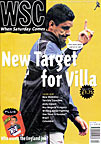 Alan Tomlinson explains how the seemingly insubstantial David Davies managed to blunder his way to a dominant position in England’s governing body
Alan Tomlinson explains how the seemingly insubstantial David Davies managed to blunder his way to a dominant position in England’s governing body
David Davies is the man some tip to succeed Graham Kelly as the top man at the Football Association. He has emerged from the inside and as the FA has stumbled from one crisis to another, he has been seen as the man most likely to restore some sense of order to the chaotic proceedings at Lancaster Gate.
The FA is in the middle of the most acute and prolonged crisis in its history. Not that it has had a lilywhite and wholly honourable past. Power and status-mad men have been drawn to the FA throughout its history, alongside public-spirited volunteers whose only thought has been to promote the grass roots of the sport.
But Sky money changed the FA for ever. It could have stuck up for the more general interests of the professional game, argued with the breakaway Premier League that some of the Murdoch cash should go to good causes within the game. But you might as well have called up Saddam Hussein as a defence witness for Bill Clinton.
At the time Sky arrived on the scene, the FA were becoming more aware of their public image. Brash and opinionated statements by old-school football administrators would not do for the slick new era characterised by the Sky poster for its Premier League launch, screeching “It’s a whole new ball game”. And that’s where David Davies came in.
Even Lancaster Gate recognised that Graham Kelly’s droning monotone was not the best basis for dealing more and more often with the increasingly voracious media pack. So Davies, with his television pedigree and media expertise, was brought in as a public relations man.
Davies is commonly regarded as a bit of a smoothie, groomed by and for the media. But let’s look at his track record in the last year at the FA. He has been busy enough.
He penned the notorious Hoddle diary within weeks of France 98 finishing. He presided over the fall from grace of his boss Graham Kelly and FA chairman Keith Wiseman in December and January. He stepped excitedly into Kelly’s shoes in time for the FA Cup third round draw and he was again in the spotlight when Glenn Hoddle was forced to leave and the search for a replacement was launched.
The Hoddle diary of France 98 was the beginning of the end for the beleaguered England coach. It is remarkable that the FA permitted its employees to produce such stuff. It is still more remarkable that its media expert was Hoddle’s partner in such an ill-starred venture.
Hoddle’s mediocre World Cup campaign and the indiscretion of the diary might have spelled an early bath for the England coach on pure football and professional grounds. But Davies’s role in the diary project provided Hoddle with a safety valve. It was surely inappropriate for the FA’s top media man to be the co-author of tabloid scoops on the tittle-tattle of the England camp and the dressing-room. But once he was, the FA had no moral basis on which to condemn Hoddle’s naive indiscretions.
Then came the issue of the £3.2 million “loan” to the Welsh FA, which resulted in the departure of Kelly and Wiseman. Many of us had heard about this back in June, before the World Cup kicked off. Many people in football politics circles were talking about it in Paris. It is inconceivable that media guru Davies didn’t know about it.
This messy “votes for bribes” affair – or, a mite more euphemistically, “generosity for co-operation” – was an internal shambles, allowing the FA council to grind slowly towards an organisational showdown. Externally, it was disastrously handled. The tabloids had a field day. David Davies deserted Kelly and Wiseman and took up a prominent role in the public eye. He was doing well enough, and seemed to have wriggled out of the limelight over the Hoddle diaries. In the wake of the departures of his old bosses, he looked a credible alternative, a cool new future.
But then an ambitious young Times journalist got down Hoddle’s eccentric views on reincarnation. Davies had been trying to insist that Hoddle should talk only about football matters. But here he let Hoddle off the leash and Hoddle talked himself into his ignominious resignation.
As if this series of embarassments were not enough, the search for Hoddle’s replacement made the FA look pretty inept. It seemed a desperate strategy to save face when Kevin Keegan was given the role of England coach exactly on the terms he wanted. Hoddle got half a million pounds payoff. All Keegan’s demands were met. Acting chief executive Davies could talk a good game in the press conference. But behind the scenes, he was heading an FA that lacked any sense of direction.
It would be both bizarre and apposite if the new FA chief executive was from the media world, a spin doctor who could talk the organisation through its biggest ever gaffes. And could then talk himself into pole position for the vacant job. Ken Bates says Davies cannot be a serious candidate to replace Graham Kelly, tainted as he is by association with a discredited regime. But the Chelsea chairman is far from being the most popular man in English football, and even if he’s right, his plain speaking may work in Davies’s favour, getting him the anti-Ken sympathy vote.
If David Davies emerges as a serious front runner for the top FA job this will say much about the troubled FA and the strange new times in which it seeks to transform itself. But such an outcome would do precious little for the reform of the game’s governing body.
From WSC 146 April 1999. What was happening this month